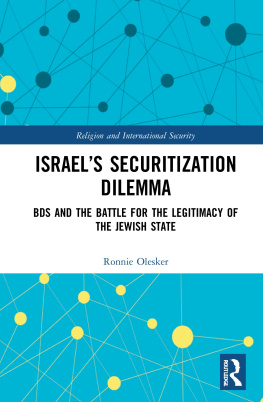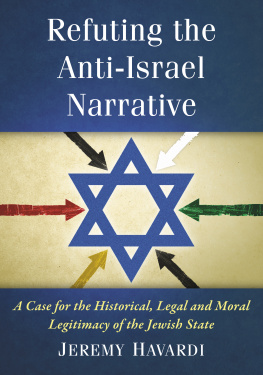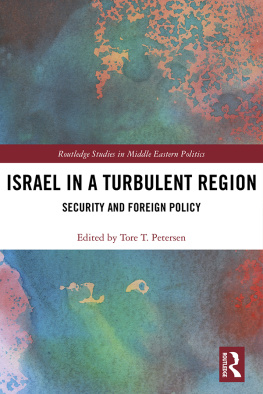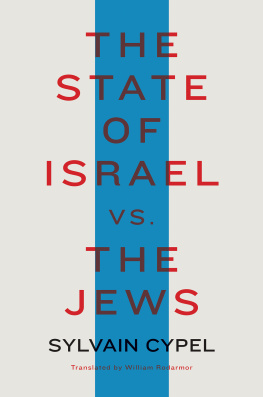Israels Securitization Dilemma
This book examines how the Zionist movement, and later the state of Israel, have dealt with various longstanding efforts to delegitimize Israels standing in the international community, including by the Arab League Boycott, the United Nations, and the Boycott, Divest and Sanctions (BDS) movement.
Through historical and archival research, as well as discourse analysis of legal and governmental documents, public statements of Israeli officials, and interviews with Israeli policy makers, this book argues that Israel has constructed perceived and real challenges to its legitimacy as ontological threats that undermine its national security, and has securitized its Jewish identity in response to these threats. As a result, the state has adopted extraordinary measures, often marked by illiberalism. Rather than enhance Israels international legitimacy, these measures have undermined it further, especially among liberal audiences in the West, whose support is critical for Israels continued international legitimacy. Therefore, Israel is locked in a securitization dilemmawhere actions taken to enhance its security through increased legitimacy result in further delegitimization. Highlighting the ways this securitization dilemma is at the heart of Israeli policymaking todayparticularly in the context of the recent BDS movementthis book brings into focus key problems that Israel faces as it attempts to combat delegitimization movements against its self-constructed identity as a Jewish state.
This book will be of great interest to students, scholars, and policy makers engaged with critical security studies and delegitimization, Israeli studies and Jewish identity, and policymaking in the Middle East.
Ronnie Olesker is an Associate Professor in the Government Department at St. Lawrence University, USA. She teaches courses on International Relations and Middle East Politics. Her research focuses on securitization studies, with an emphasis on the securitization of ethnic identities.
Religion and International Security
Series Editor:Lee Marsden,University of East Anglia, UK
In the twenty-first century religion has become an increasingly important factor in international relations and international security. Religion is seen by policy makers and academics as being a major contributor in conflict and its successful resolution. The role of the Routledge series in Religion and International Security is to provide such policy makers, practitioners, researchers and students with a first port of call in seeking to find the latest and most comprehensive research on religion and security. The series provides established and emerging authors with an opportunity to publish in a series with a reputation for high quality and cutting-edge research in this field. The series produces analytical and scholarly works from around the world that demonstrate the relevance of religion in security and international relations. The intention is not to be prescriptive or reductionist in restricting the types of books that would be appropriate for the series and as such encourages a variety of theoretical and empirical approaches. International security is broadly defined to incorporate inter and intra-state conflict, human security, terrorism, genocide, religious freedom, human rights, environmental security, the arms trade, securitisation, gender security, peace keeping, conflict resolution and humanitarian intervention. The distinguishing feature is the religious element in any security or conflict issue.
Israels Securitization Dilemma
BDS and the Battle for the Legitimacy of the Jewish State
Ronnie Olesker
Fallacy of Militant Ideology
Competing Ideologies and Conflict among Militants, the Muslim World and the West
Munir Masood Marath
For more information about this series, please visit: https://www.routledge.com/Religion-and-International-Security/book-series/RELSEC
First published 2022
by Routledge
2 Park Square, Milton Park, Abingdon, Oxon OX14 4RN
and by Routledge
605 Third Avenue, New York, NY 10158
Routledge is an imprint of the Taylor & Francis Group, an informa business
2022 Ronnie Olesker
The right of Ronnie Olesker to be identified as author of this work has been asserted by her in accordance with sections 77 and 78 of the Copyright, Designs and Patents Act 1988.
All rights reserved. No part of this book may be reprinted or reproduced or utilised in any form or by any electronic, mechanical, or other means, now known or hereafter invented, including photocopying and recording, or in any information storage or retrieval system, without permission in writing from the publishers.
Trademark notice: Product or corporate names may be trademarks or registered trademarks, and are used only for identification and explanation without intent to infringe.
British Library Cataloguing-in-Publication Data
A catalogue record for this book is available from the British Library
Library of Congress Cataloging-in-Publication Data
Names: Olesker, Ronnie, author.
Title: Israels securitization dilemma: BDS and the battle for the legitimacy of the Jewish state / Ronnie Olesker.
Other titles: Religion and international security.
Description: London; New York, NY: Routledge/Taylor & Francis Group, 2022. | Series: Religion and international security | Includes bibliographical references and index.
Identifiers: LCCN 2021007140 (print) | LCCN 2021007141 (ebook) | ISBN 9780367551674 (hardback) | ISBN 9780367551728 (paperback) | ISBN 9781003092285 (ebook)
Subjects: LCSH: National securityIsrael. | Legitimacy of governmentsIsrael. | Boycott, divestment, and sanctions movement. | Arab-Israeli conflict. | Zionism. | JewsIsrael. | IsraelPolitics and government.
Classification: LCC UA853.I8 O44 2022 (print) | LCC UA853.I8 (ebook) | DDC 355/.03355694dc23
LC record available at https://lccn.loc.gov/2021007140
LC ebook record available at https://lccn.loc.gov/2021007141
ISBN: 978-0-367-55167-4 (hbk)
ISBN: 978-0-367-55172-8 (pbk)
ISBN: 978-1-003-09228-5 (ebk)
Typeset in Times New Roman
by codeMantra
To Ilan, who taught me to strive to do better, and Ora, who inspires me to keep up the good fight.
Since the country was first formed, the notion of legitimacy has been central to Israels security. This can be seen throughout Israels history, and politicians, academics, intellectuals, activists, and citizens consistently express their understanding of the state and its existential security through the notion of legitimacy for the Jewish identity of the state. Many of the key laws and acts relating to the formation of the stateincluding The Balfour Declaration, the establishment of the British mandate over Palestine, and UN Resolution 181 from 1947 (which suggested the partition of Palestine into two states, Jewish and Arab)all played a role in legitimizing the Jewish character of the state. Because of this historically central role legitimacy has played in Israel, it has long been part of Israels policies.
As a matter of empirical fact,
Similarly, as noted in the introductory chapter to this book, in 2015, the Knesset introduced an amendment to the Entry Law of Israel (the amendment was later passed in 2017) to allow the Minister of the Interior to deny entry to Boycott, Divestment and Sanctions (BDS) activists and supporters. In the explanatory notes to the law, legislators argued that Israel was facing a new campaign in the war against it, and that until the law was introduced, the state was prevented from preparing for this campaign adequately. Moreover, legislators argued that letting BDS activists into the country would expose Israeli citizens to harm (Harkov 2018).









